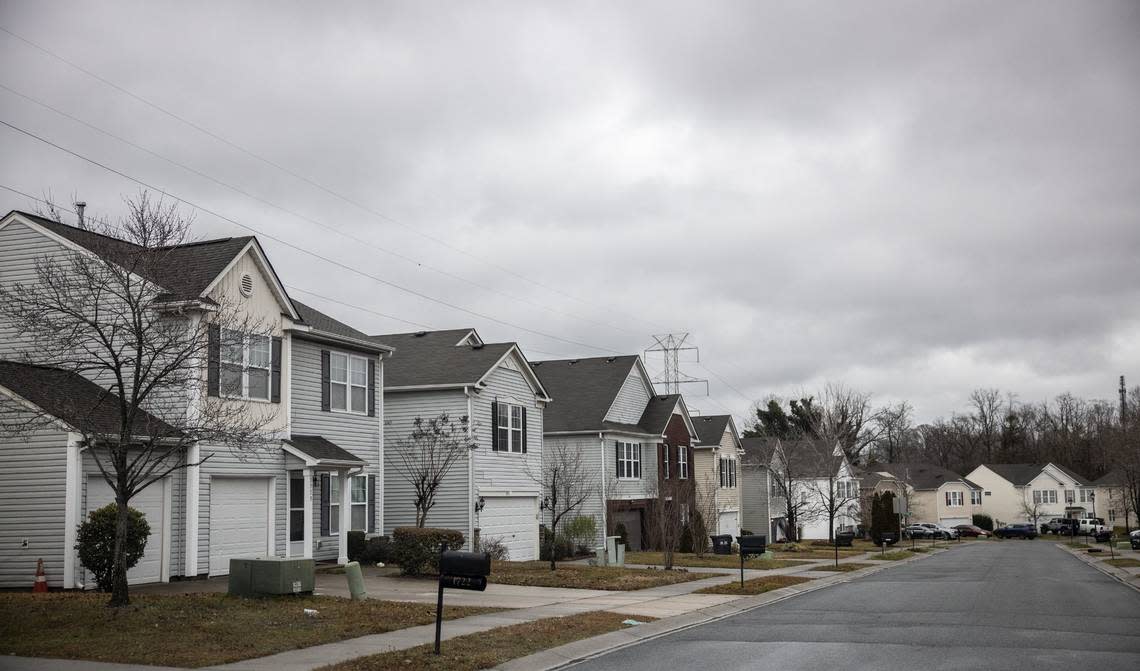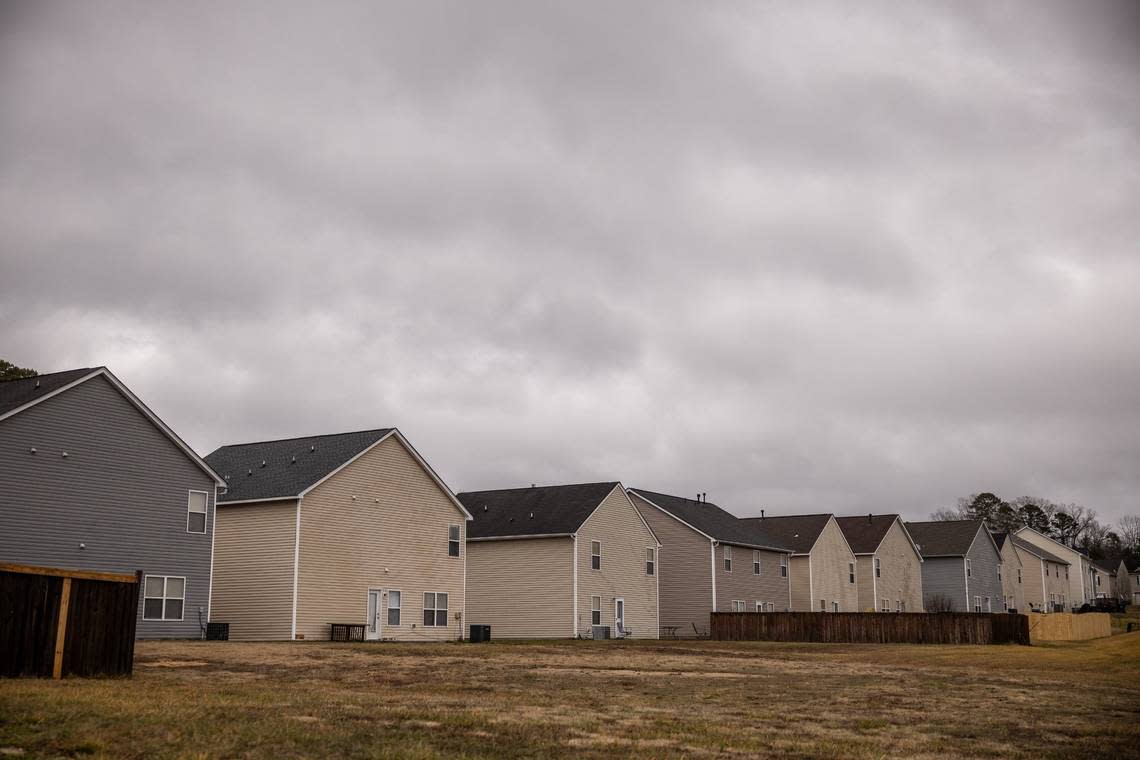Bill would limit corporate landlord homes in Charlotte, the Triangle and more of NC
Democratic lawmakers in some of North Carolina’s fastest growing cities want to ban corporate landlords from owning too many rental homes in areas like Charlotte and Raleigh.
Rep. Kelly Alexander, D-Mecklenburg, introduced the Home Ownership Market Manipulation Act last week to cap — at 100 — the number of single-family homes that people or businesses can buy in the state’s most populous counties. The measure, co-sponsored by Democrats in Mecklenburg, Guilford and Cumberland counties, is unlikely to pass the Republican-controlled legislature.
But it’s the first such proposal aimed at combating the growth of Wall Street-backed firms that have converted tens of thousands of homes to rentals across the country over the past decade.
As of early 2022, about two dozen firms had amassed more than 40,000 properties in North Carolina, according to a months-long investigation by The News & Observer and The Charlotte Observer. That reporting showed corporate landlords owned at least 1 in 20 single-family houses in the Charlotte area, along with about one-quarter of the rental home market there.
Critics of the rental home industry — and the text of the bill itself — warn that investor activity in the housing market has lowered supply and increased costs for families, especially for first-time homebuyers.
The industry has pushed back on that critique, arguing that they provide more options for families who can’t afford or don’t want to own homes.
Single-family rentals “are a critical part of America’s housing ecosystem,” National Rental Home Council CEO David Howard said in a statement to The N&O this week. The trade group represents Progress Residential, American Homes for Rent, Invitation Homes and other major corporate landlords.
The House bill, Howard said, “doesn’t present a realistic solution to the housing supply crisis,” and he urged lawmakers to focus on increasing housing stock.
“The reality is legislation like this will only reduce the availability of single-family rental housing while making housing more expensive — ultimately hurting the very people for whom access to affordably priced rental housing is so essential,” Howard said in the statement.
Corporate ownership tough to track
The House bill’s quota would apply to single-family properties in the 18 North Carolina counties with populations above 150,000. That would include major urban centers of the Triangle, Charlotte and the Triad, as well as areas around Asheville, Greenville and Wilmington.
Civil penalties under the bill could add up to $100 per day per property exceeding the cap, in addition to court fees and damages.
In an interview with the N&O Wednesday, Alexander said his bill is an attempt to give communities tools to prevent corporations from distorting local housing markets.
”If we allow untrammeled capital to just buy up neighborhoods, your average individual — especially someone looking for workforce housing or first-time homebuyers — they’ll be priced out of the market,” Alexander said. “That’s not good for society.”
As a practical matter though, tracking the scale of corporate ownership across multiple counties would likely prove difficult.
The country’s largest rental companies, as the N&O/Observer series detailed last year, conduct business through a web of subsidiaries and holding companies whose names are recorded in often messy county property records.
The 100-home cap would apply to both the parent company and its subsidiaries. But the link between them isn’t always obvious — it took months for reporters at The N&O and Observer to tie more than 300 subsidiaries registered in North Carolina back to the 20-odd parent companies that owned 100 properties or more.
Measures state lawmakers passed in the last decade, meanwhile, have made keeping accurate counts even harder.
In 2016 and again in 2019, the legislature passed laws to prohibit local governments from requiring landlords to register their properties, ending such programs in cities like Raleigh and Charlotte.
Alexander said that’s why his bill empowers the state attorney general’s office to conduct investigations into large-scale ownership. It also allows county residents or a county’s board of commissioners to take corporate landlords to court for breaking the rules.
N.C. Department of Justice spokesperson Nazneen Ahmed said the agency was not consulted on the bill and declined to comment on it.
Proposal is a rarity among state legislatures
Nationwide and in North Carolina, there’s been little action to check the explosive growth of the single-family rental industry. These companies first emerged in the aftermath of the Great Recession, spurred in part by federal policies allowing investors to scoop up scores of foreclosed properties to stabilize the tanking housing market.
Some homeowners associations have stepped in to cap rentals in their neighborhoods, as The Observer has reported. But those efforts have been piecemeal. North Carolina municipalities, meanwhile, have been reluctant to institute their own regulations.
Uyen Vong, a spokesperson with the National Conference of State Legislatures, said that as far as his organization is aware, North Carolina is the only state to introduce a measure capping investor-owned rental properties. Vong added that NCSL doesn’t track local legislation by cities and counties, which have taken steps in other states like New Jersey to address the growth of corporate landlords.
There have, however, been efforts to slow or reduce large-scale home ownership on the national level.
In July, U.S. Rep. Adam Smith, D-Washington, proposed levying a “real estate transfer tax” equal to a property’s sale price for any large firm buying a single-family home. U.S. Sen. Jeff Merkley, D-Oregon, introduced a bill in November that would penalize owners of more than 100 single-family homes $20,000 per property. The measure would also require firms to sell 10% of their housing portfolio a year until they meet the 100-home limit.
Jim Joyce, an assistant professor at the UNC School of Government who specializes in community planning and development, said he hasn’t analyzed the North Carolina House bill closely yet. But “in this case, it may be a bit of a new frontier in terms of what we can and cannot regulate.”
‘We’re not going to go there’
While the proposal introduced in the North Carolina legislature would stop future purchases by companies that reached the cap, it would not require companies to sell the single-family homes they already own.
“Progress and Invitation Homes would keep their portfolios,” said Madeline Bankson, housing research coordinator with the Private Equity Stakeholder Project. The national watchdog group has been critical of the massive hedge funds behind the nation’s largest corporate landlords and has pushed North Carolina’s pension fund to stop investing with them.
Dealing with that existing ownership, Bankson said, might make more sense on the federal level. But they called the state-level proposal in North Carolina “really fantastic.”
“It really gets to the root of the problem in a way that a lot of other polices don’t,” they said. “The problem is consolidation of ownership to the point where there is an imbalance of power — local companies and families just can’t compete.”
But Speaker Tim Moore, R-Cleveland, told reporters last week that the bill won’t go far in the state House.
“I understand what Rep. Alexander is concerned about,” Moore told reporters last week in comments first reported by WRAL News. “But the day we start saying that companies here and citizens in this state can’t own or are limited to how much property they can own — that would be a dangerous day.”
He said he hasn’t seen any data to support the claim that corporate landlords are contributing to increased housing prices. The idea to limit ownership, he said, amounts to “pretty big government, and we’re not going to go there.”
Alexander said he wasn’t surprised by the speaker’s opposition, and he’s discussed with Moore and other Republicans what additional policy solutions might work to help increase housing stock. There’s no one solution, he said, but “nothing changes if we just sweep it under the barrel.”
Even though the bill is dead on arrival, Bankson said it may still have value down the road.
“It gets the conversation going, if nothing else,” Bankson said. “It motivates people to start asking questions about what’s going on in the housing system and, to some extent, start pushing for change.”
The News & Observer’s Kyle Ingram contributed reporting.



